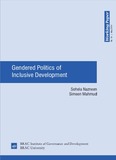| dc.description.abstract | Political settlement frameworks are gender blind. In this paper, we interrogate the nature of gendered political settlements through analyzing selected country cases studies of the gendered nature of political and policy-making processes and identifying the different contextual and structural factors that promote gender-inclusive development policies and outcomes. These factors include elite support for a gender equity agenda; the ability of the women’s movement to contain oppositional elite or non-elite groups; transnational discourse and actors creating space for the gender equity agenda; the presence of male allies and ‘femocrats’ within the state apparatus; and policy coalitions exerting pressure on the state. The political opportunity structure and the history of how women’s political entitlement was established to influence the dynamics between these factors. Based on this analysis, we argue that a political settlement framework stands to gain from using a gender lens as it allows for exploration of the role played by (gendered) ideas, (gender) ideology, informal relations, policy coalitions, bottom-up strategies in how settlements are reached and sustained. The challenge is whether the parameters of PS can be expanded. | en_US |

